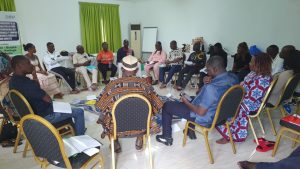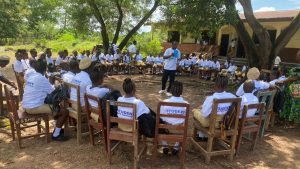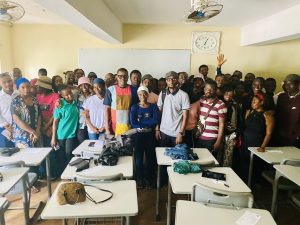“Before this project, I really did not see the point of life or the need to go on living, I was just existing. I have grown so much that now I help other women and girls; I look forward to our meetings where we sit and support each other …”
When she was only 14 years old, Aisha, a resident of Borno, a state in northeast Nigeria, was kidnapped by Boko Haram members and taken into the forest. She was beaten for trying to escape days into her capture and forcefully married off to one of the insurgents.
“He forced himself into me almost on a daily basis,” she recounted. “A few weeks later, I started to feel nauseous. I had met an elderly woman who had become like a mother to me. She told me I was pregnant. She took delivery of my baby when I was due. There was no medical support. No food. She gave me only warm water.”
By the time her son was seven months old, Aisha attempted to escape a second time and succeeded. She reunited with her sister, who had also managed to escape from captivity. But her experience of repeated rape and sexual violence while in the terrorist cell still haunts her. She is starting to get better now that she is with friends and has more access to food. But, she says, whenever she closes her eyes, she gets flashbacks that renew her trauma.
Aisha and 499 other survivors of conflict-related Gender and Sexual Based Violence were supported through an ATJLF-funded initiative implemented by the Milestones Rehabilitation Centre. All 500 survivors received psychosocial support services. In addition, 30 of them were trained to function as Peer Support Counsellors for other survivors to ensure continuity of support.
Through this project, it became apparent that gender-based violence in the northeast is not only perpetrated by terrorists against their abductors, but also by law enforcement officers against those they are supposed to protect, among other classes of people.
Hauwa [not real name], one of the girls who spoke to Milestones’ volunteers, was just 13 when Boko Haram members invaded her hometown, killed her father, and displaced her family. When she got to the IDP camp in Maiduguri, a police officer invited her to his house apparently to help with chores. But as soon as she got there, he pushed her into his room.
“He raped me and told me not to tell anyone about it; otherwise, he will kill me,” she narrated. “I told my mom, but she told me to keep quiet. He raped me again, but the third time I screamed. Fortunately, some of neighbour heard me and rescued me.”
Few months later, she became pregnant. The police officer pleaded with her not to report him and promised to support her. He did this for a while before he got transferred to a different state. Hauwa’s mom refused to follow up the case.
“People laugh at me,” she said bitterly. “They say I kept going back. It makes me angry. It makes me sad.”
With the intervention of the Milestone Rehabilitation Foundation and ATJLF, girls like Hauwa finally have a safe space to share their traumatic experiences without guilt or judgment as well as access to badly needed medical and psychological assistance.
The beneficiaries were empowered to seek and drive transitional justice-related activities in their communities.
Portions of this impact story first appeared on HumanAngle



